
Above: DiaoYuTai State Guesthouse, Beijing. Since Kissinger, 100s of presidents and prime ministers have met Chinese leaders here.
Chinese Meetings - The Chinese Way
MODERN TIMES VILLAGE HEAD KEY TO SUCCESS
HOW WAS YOUR MEETING?
When foreigners tell stories about Chinese meetings, they talk about dinners. Chinese want to surprise foreigners with exotic dishes. Much less is told about what happens during the real meetings.
FOREIGNERS WANT SPEED
Recent years over 65.000 foreigners "work hard" in Beijing to build Chinese businesses. Their life is meetings after meetings. Many believe that progress could be faster.
What is blocking the speed? Have foreigners understood Chinese mentality correctly? Middle way? Guanxi? Indirectness? Are meetings in China effective enough to support faster speed? Are foreigners effective when communicating with Chinese?
IN CHINA NEVER ASK "WHY"
This was one of my first learnings in China. I was advised by head of U.S. chamber of commerce who had 25 years experience of life in China. He told me that never-ask-why rule will save my time and help me not to get stuck into situations.
I kept that rule, for many years as it seemed to be valid. But not so any more. Increased speed and new choices require the WHY word.
INSIDER OR OUTSIDER
Many foreigners who do business in China say, that they can't really trust Chinese. They forget to ask themselves How many Chinese trust me? Trust crises is true but must be understood from all angles.

Left:
DiaoYuTai State Guesthouse in Beijing.
It is possible to use DiaoYuTai for business meetings. It was built 800 years ago as a fishing terrace for Emperor ZhangZong (1113-1234) of Jin Dynasty. Today DiaoYuTai is the most elegant and exclusive meeting place in Beijing.
Chinese employees sense foreigners' attitudes. They know foreigners' understanding about Guanxi is limited. If a foreigner becomes labeled as a real foreigner, it's not helpful. Being a real foreigner equals an outsider. With such a status information flow will be limitted and business development in China will become slow, difficult.
MY FUTURE IS MINE
Foreigners have a mindset of working for their company. Chinese are different. Since ancient times till today, Chinese parents expect children to be ChuRenTouDi, or one head taller than the others. They can say Where is your future if you only work for the others?
Chinese don't feel satisfied when working for a company, even for a multinational corporation with a better pay. Chinese work for themselves, or their manager. Yet, Why should I serve you? rotates in millions Chinese minds every day.
EMOTIONS INTO USE
A manager can make a difference, and Chinese employees can be responsible and bring results for their manager. For that, Chinese employees must be able to accept their manager fully, admire him/her, be able to rely on him/her, and establish a feeling based emotional bond with him/her. This emotional bond and trust must be mutual. It makes Chinese to work hard for their manager.
Next question in Chinese employee's mind is How much you care about me, if I care about you this much?
Expectation for better compensation raises together with business results. Chinese compare their social status, money and advantages against others. As a manager, make no failure noticing that. Learn about Chinese way of indirect communication and it's interpretation.
"VILLAGE HEAD" MAKES GOOD MANAGER IN CHINA
Good manager who can bring results, can be a foreigner or local. He/she should be a kind of modern Village Head, who shows care and thinks for his employees' best. Village Head needs to use his/her capacities to win respect. Respect must be mutual and always emotionally loaded.
CHINESE HR USES CHINESE SPICES
In China HR and career decisions are often not rational. Companies have rules and procedures, but emotions hiddenly play major role in Chinese HR. Candidates who would be easy to manage are preferred. Criteria is often set so that individuals with strong own ideas get rejected. This can slow the speed of getting business into scale, pro-activity, innovation and competitiveness.
In China, Guanxi, relations, play major role in career development. Career decisions require balance between internal relations. This is the highest priority, which consumes energy and adds complexity. Learn about the requirements for Guanxi.
PRODUCT = PRODUCT + GUANXI
In China the era of pure 100% Guanxi relations based business is about gone. Today your product is maybe half, and the rest is Guanxi. Don't overestimate your product, don't underestimate Guanxi which is strong in new China. Use the WHY word to find out the way and backdoor, if needed.

Left:
DiaoYuTai State Guesthouse. Building No.5 Banquet Hall has 20 of these comfortable chairs.
PRIVATE SALES MEETINGS
In the West we have learned that our customers can make rational choices and decisions. In China not always so. You need to extend your product by Guanxi. This is 1 to 1 meeting. Purpose of the private sales meetings is to work for the Guanxi.
You need to win the customer representative(s) to become your supporters for later pre-sales and sales meetings. You need to be able to answer
- Why business with you is worth of it
That question is a very private question, bigger than your product.
During private sales meetings, customer representatives will compare your product's weaknesses and strengths openly to your competition. Customer's requirements are discussed and can be re-set to match. Your company's image is important. A born-in-Beijing businessman described this meeting:
- West is plan driven but Chinese customers are situation driven
Most importantly, Guanxi is built and agreed.
PRE-SALES MEETINGS
More customer representatives join into these meetings. Products and solutions are introduced in detail and presentations are made. But the content in these pre-sales meetings is not overly meaningful. If you have won the influencers or key decision makers to your side during earlier privater sales meetings, most likely others will follow them and become your supporters.
SALES MEETINGS
These are formal meetings and time for serious talks. Before the sales meeting you must know who is on your side and will support you. During these meetings the persons you have made Guanxi during earlier private sales meetings, will talk for you. The weak points of your product or solution will not be mentioned, or are set as minor.
PUBLIC BIDDING MEETINGS
During these meetings your goal is to get selected into final short list. Usually two alternatives are selected. These meetings can be either serious or formality, depending on the level of your Guanxi.
COMMERCIAL TERMS MEETINGS
You were selected to the short list of two vendors. Now is the time for bargaining. You may quote "10" but you should be ready for "8", or facing additional requirements by customer. Always, and this means ALWAYS, if the key high rank person or Leader joins the meeting, you should be ready to give concessions to show your sincerity.
If high rank wants to press his fingerprint into coming contract, you should give something on delivery times, services, prices, or after sales support. Just give-up something. This doesn't need to be one-directional, you can ask customer to make concessions in return.
If Chinese hold strong position in negotiation, they feel confident to be direct instead of being indirect. Directness may also be selected as negotiation strategy: be prepared! Understand your position.
You must get-prepared for this meeting from the very beginning. Plan well your play. Know the strength of your Guanxi, worked earlier during private sales meetings. Prepare your concessions. Think through your alternatives. Learn the play.

Left:
A full day meeting and seminar in ZhengZhou, Henan province. A square was made, BeijingMan included. How many participants in this sales meeting?
Over 30 participants, China has scale and numbers are big.
CUSTOMER PRESENTATIONS
In China a good customer presentation is about showing confidence and building image. Details are very important, more so than concepts. You need strong technical knowledge to show your competence and become credible as a person.
You should take authority in technical issues. Then, if you also have good industry knowledge, wider scale discussions can make you an expert, influencer, in customer's eyes. Then your international success stories are taken seriously.
You must listen to experts and learn presentation Dos/Don'ts in different types of meetings. There is difference between the meetings with Leaders, with Deciders, or with Engineers. Learn also the expectations during media meetings and ritual dinners.
PROJECT MEETINGS
Too often project Kick-Off is the only opportunity to celebrate project. Chinese say HuTouSheWei meaning Starting with Tiger's head, ending with Snake's tail. Tiger's big head is a big celebration at the beginning, then it vanishes as a snake's tail.
INTERNAL MEETINGS
In multinationals corporations or any large organization, progress is made through meetings and by decisions. I have worked for companies in Europe and U.S., internal meetings could most often be more productive. Multicultural meetings in China are no exception.
Experiences:
- Meeting has no "village head", no agenda, not even purpose
- Not prepared: "I only got to know 2 hours ago about this meeting"
- Come late, play busy, leave early, avoid action points
- Time kill: read emails and browse, don't participate
- After meeting no memo, no action points
- How to answer mobile phone during a meeting? Bend head under meeting table, disappear and do your murmur. Caller never knows your situation. Seen this several times but not been there myself, sofar:)
Village Heads and HQs
EPILOG
Business in China is a fast developing target. To succeed, you have no choice but to understand Chinese mentality, market and business culture. Chinese work for a person, not for a company. You need to find a Village Head who is able to develop emotional bond to enact your Chinese for results.
You can go meetings with Chinese and introduce what's in your mind and what outcome you would like to have, to catch reaction. But learn to trust your Chinese collegues when they analyse the situation and Chinese business behavior, or China market.
China is reforming and new requirements arise. Your Chinese competitors know this and make fast adaptation. If product modifications are proposed for fit and match, take it seriously or loose the opportunity. In China, speed is essential in your reply.
Within Chinese business environment your Chinese team can become as efficient in bringing results as your European or U.S. team in their domestic environments. But you need to listen, estimate, empower and reward.
Foreigners want speed. But slowest actors in Chinese business often are foreigners who want rotate decisions via headquarters in Hong Kong, Singapore, U.S. or Europe. HQs abroad seldom understand about Chinese culture, business realities, or need for speed. HQs which is not able to make decision in Chinese rhythm, loose the opportunity. Winning by empowerment is possible.
Success in mainland Chinese markets is not about how you hand your business card to your customers. For the real factors, this is my advice for achieving business results in China:
• Must understand the difference, the real contrast
• Learn your industry's behaviour, find a Chinese insider expert
• Learn the Chinese way in partnerships, selling, buying
• Society relations if you are planning for long term
• The middle way
• Village-Head personality to lead your team
• Learn the Chinese sales meeting flow with Guanxi
• Get-prepared for commercial terms/pricing negotiations
• Guanxi in pre-sales, in project management, in after-sales
• How to avoid company's internal over-localization
• Get-prepared for typical meeting strategies taken by Chinese
• Presentation DOs/DON'ts in different types of meetings
• Essentials when meetings Leaders; Deciders; Engineers
• Essentials when meeting high rank Chinese officials, ministers
• Company image build-up; media meetings; rituals, dinners
• Indirect communication which sometimes turns direct
• How to motivate Chinese teams and partners
• Risks and benefits of agree and adjust mindset
• Tricks knowledge 'survival kit' needed
• Personal responsibility vs Group responsibility; Trust; MoQi
• Localising western products for China market to create fit
• Comb the Chinese culture to increase potential of your product
• Learn about cultural Treasure Box that others don't have!
• Learn about Chinese poems, posters, proverbs, slogans, humor
• Gift process: gift levels for different level of persons
• VIP person process for meeting and hosting in China/abroad
• Show respect
Then, you still must be able to learn faster than the others.
-- BeijingMan
______________________________

Above-1: "Fishing Terrace", DiaoYuTai State Guesthouse, Beijing. In Peony Hall, Building No.5, ceiling color changes, unique changing atmosphere for events and dinners.

Above-2: Peony Hall in Building No.5, DiaoYuTai State Guesthouse, Beijing. The complex was built in 1959. It has a small lake, pines, cypresses and other trees. Good-will trees planted by visiting leaders. Buildings are numbered. Area has also 18 villas with 400 suites.

Above-3: DiaoYuTai State Guesthouse, Beijing.
Peony Hall in Building No.5

Above-4: DiaoYuTai State Guesthouse was built in 1959. In 1971 and 2023 Henry Kissinger and by now over 800 presidents, prime ministers and celebrities have stayed there. During Culture Revolution Madame Mao Jiang Qing lived in DiaoYuTai.
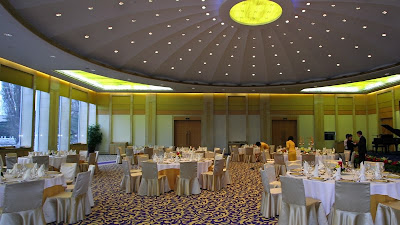 Above-5: DiaoYuTai State Guesthouse, Beijing.
Above-5: DiaoYuTai State Guesthouse, Beijing.Peony Hall in Building No.5.

Above-6: DiaoYuTai State Guesthouse, Beijing.

Above-7: DiaoYuTai State Guesthouse, Beijing. Host gives welcoming speech. Business talks took about an hour, then 2-hour dinner and flow of entertaining artists performing music, singing, dancing, magic, and Peking Opera.

Above-8: DiaoYuTai State Guesthouse, Beijing. Peony Hall in Building No.5 is not small, this time 80 persons participated, 8 big round tables. Later event's host and a few key persons went to raise toast with each customer table.

Above-9: DiaoYuTai State Guesthouse, Beijing.
Banquet Hall of Building No. 5.

Above-10: BeijingMan in Banquet Hall of Building No.5 in DiaoYuTai State Guesthouse, Beijing. For presidents and celebrities.
- Elegant facilities, good quality, professional service personnel, unique history, just top place in China.
Above-11: Kissinger and Xi at DiaoYuTai State Guesthouse, July 2023.
Red and White Plums, Chinese guohua painting by Guan ShanYue, with a message: "Plum blossoms proudly in snow, in frost. Politicians should be like plum blossoms, blooming in frost, thinking well-being of the people of the two countries, righteousness."

Above-12: DiaoYuTai State Guesthouse, Beijing.
Meeting room in Building No.5

Above-13: DiaoYuTai State Guesthouse, Beijing.
Banquet Hall of Building No.5
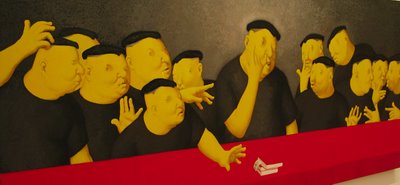
Above-14: Chinese Meetings! Many me! MeiShuGuan Art Gallery, Beijing.
 Above-15: Side meeting during a conference in Shanghai.
Above-15: Side meeting during a conference in Shanghai.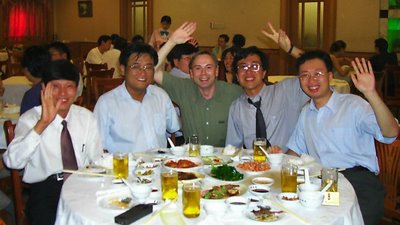
Above-16: Neusoft JV-partner meeting, Beijing. After, we went to special goose head restaurant at main avenue to celebrate. I ate three crispy half-heads with cold beer.

Above-17: Meeting, done, Western dinner at Morels Restaurant, GongTiBeiLu, Beijing. Morels is known for their Brussels Pepper Steak, Belgium beer and deserts.
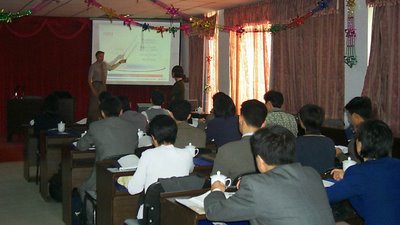 Above-18: Presentations and meeting in ZhengZhou, Henan Province, one hour flight from Beijing to South. ZhengZhou has 10 million people, Henan 97 million.
Above-18: Presentations and meeting in ZhengZhou, Henan Province, one hour flight from Beijing to South. ZhengZhou has 10 million people, Henan 97 million.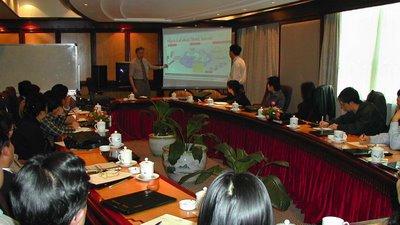
Above-19: Presentations and meeting in Kunming city, capital of Yunnan province, South China.
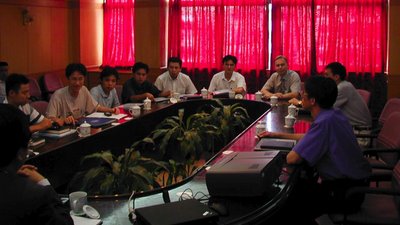
Above-20: Meeting in Haikou city in Hainan province.
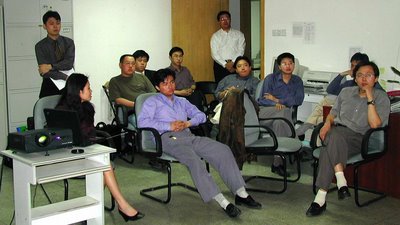
Above-21: Relaxed meeting, office in Hefei city, Anhui province.
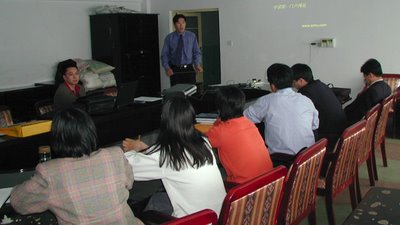
Above-22: Meeting at an office in ShiJiazHuang city, capital of Hebei Province, 400 kilometers drive from Beijing. ShiJiazHuang has about 10 million inhabitants, Hebei Province 67 million.
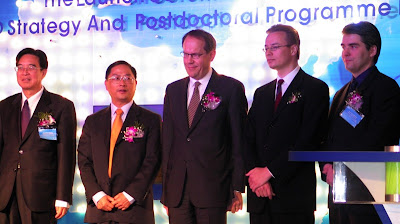
Above-23: Nokia's CEO Jorma Ollila (middle) joined Beijing meeting.

Above-24: Partner meeting in Shanghai.

Above-25: Nokia's international innovation meeting in HangZhou.

Above-26: Team meeting and dinner. Good times.

Above-27: Students participating Java lectures at Beijing University of Aeronautical and Astronautical, BUAA.

Above-28: Our work team for Java trainings and mobile applications at Beijing University of Aeronautical and Astronautical, BUAA.

Above-29: Celebration dinner with students and organizers from Beijing University of Aeronautical and Astronautical, BUAA.

Above-30: Markus Leikola, CEO of A4-Media from Finland. Presentation, meeting with China Mobile at this west Ring-2 office in Beijing.

Above-31: Foreigners, meetings, dinner. Beijing Golden Tripot restaurant (JinDingXuan) which is famous for Sichuan waitresses. Happy faces!
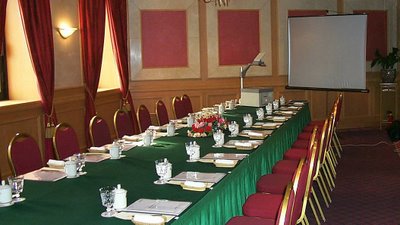
Above-32: Any 4-5 star hotel in Beijing can offer this kind rooms for meetings. Usually all services are fine.
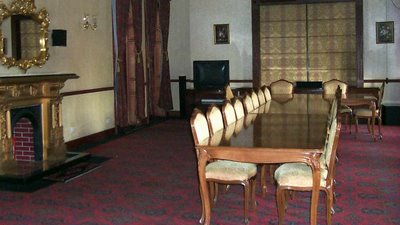
Above-33: Meeting room at Royal Club, Beijing.
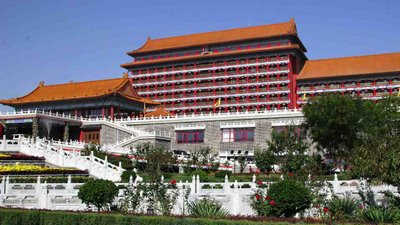
Above-34: This 5-star hotel is one hour drive from Beijing, in XiangHe, “Fragrant River”, Hebei province. Meeting of G20 was once held here.

Above-35: DiYiCheng near Beijing. G20 leaders had a meeting here.
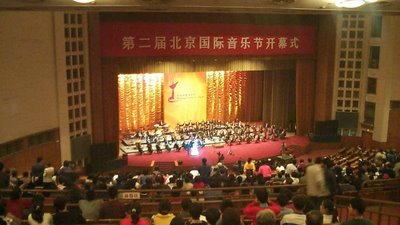
Above-36: The biggest meetings in China are held at People's Great Hall, built in 1959, at TianAnMen Square. Visited here four times: dance show, concert and events hosted by Chinese SOEs. The hall can have 5000 guests and show may have lots of dancers, singers and players flowing through.
LIANG HUI. Every year People's Great Hall hosts Liang Hui, the meeting of National People's Congress (NPC) and The Chinese People's Political Consultative Conference (CPPCC). Meeting takes two weeks. It's like a clockwork and lines are straight.
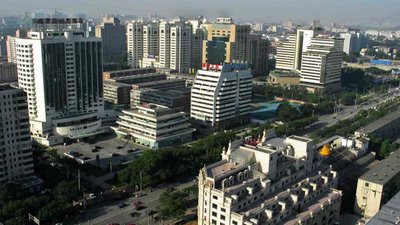
Above-37: Sometimes I climb roof tops for photos. This is view over GongTiBeiLu avenue in Beijing. Up-right, elegant building with horizontal lines is Hotel Swissotel, also known as Gang-Ao ZhongXing or HongKong-Macao Center.
Hotel Swissotel, no more the same 5-star paradise it used to be. Used their gym for several years.
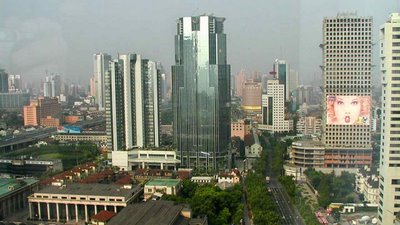
Above-38: View from Shanghai JC Mandarin Hotel.
Foreigners like to live in Shanghai. Life is easy as people there are more eager to use English. Many good quality Western restaurants. I don't know better Hard Rock Cafe in China than the one in Shanghai.
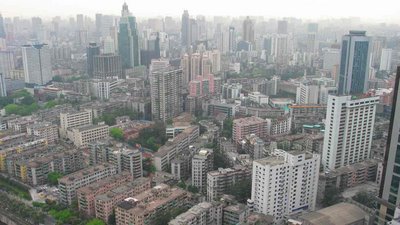
Above-39: GuangZhou city from my hotel room at International Hotel.
If Beijing is intellectuals, Shanghai is money and small businesses, and GuangZhou is speed and manufacturing. Many new things into China markets come via GuangZhou which is located near Hong Kong.
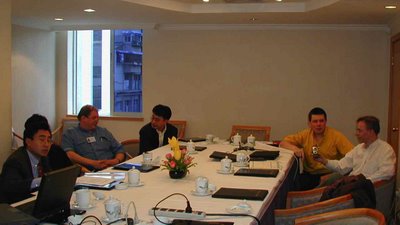 Above-40: Kunming, Yunnan Province. Before customer meetings we had a get-prepared meeting, here in Nokia Kunming office.
Above-40: Kunming, Yunnan Province. Before customer meetings we had a get-prepared meeting, here in Nokia Kunming office.
Above-41: Kunming, Yunnan province. on the right is Holiday Inn, picture taken from Kunming Hotel. Nice town, pleasant climate, one good pizza owen and good pizzas!
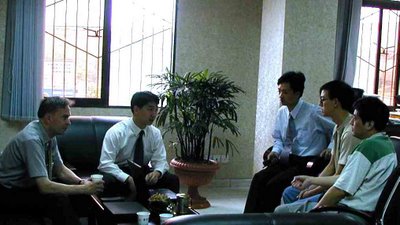 Above-42: hongQing, city of over 30 million people, two meetings, with China Mobile and China Unicom. Spicy food of ChongQing.
Above-42: hongQing, city of over 30 million people, two meetings, with China Mobile and China Unicom. Spicy food of ChongQing. Above-43: Hangzhou, Zhejiang Province. Snake for lunch at Hangzhou Technical University.
Above-43: Hangzhou, Zhejiang Province. Snake for lunch at Hangzhou Technical University.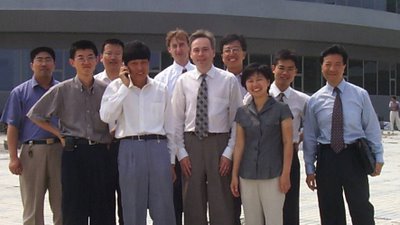 Above-44: Dalian, North-East China. Neu-Alpine's new software center soon ready. A hot and windy day.
Above-44: Dalian, North-East China. Neu-Alpine's new software center soon ready. A hot and windy day.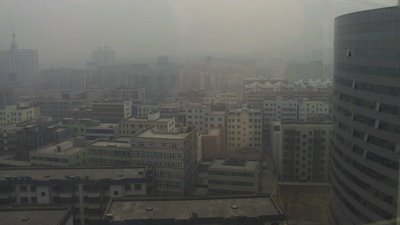
Above-45: ZhengZhou city in Henan province. Many times and every time just like this.
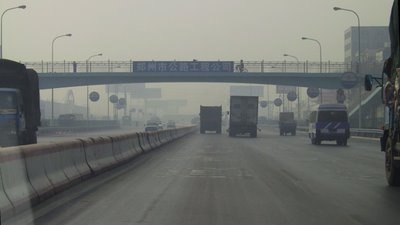
Above-46: ZhengZhou in Henan. Heading towards airport and Beijing.
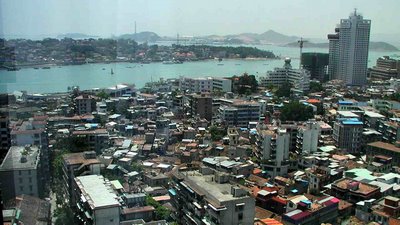
Above-47: Xiamen city in Fujian province, opposite to Taiwan island. Nice city.
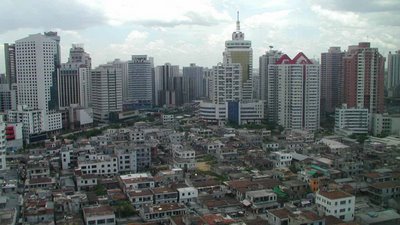
Above-48: Haikou city in Hainan, the island province in South China.
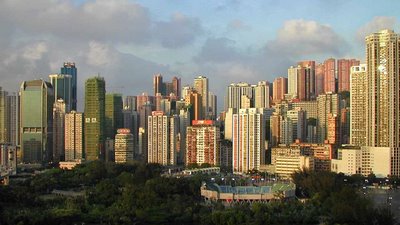
Above-49: HongKong's Victoria park.
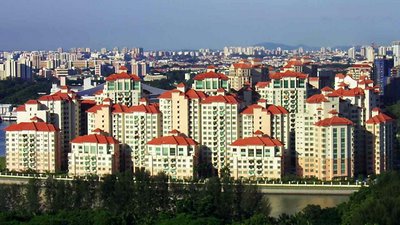
Above-50: View over Singapore. Singapore is more refined than HongKong. View from Conrad Hotel.
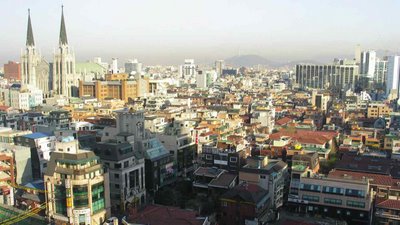
Above-51: Seoul. Here the ladies drink beer, 5-8 liters beer jar on the table! Pretty different.
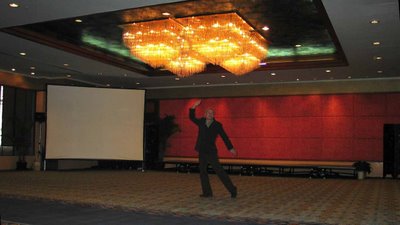
Above-52: After a good meeting in Beijing Hilton.
Above-53: Another good meeting. Lunch starting with leaders and executives after discussions. Excellent local wine and dishes filled our table.
© BeijingMan 2024




No comments:
Post a Comment